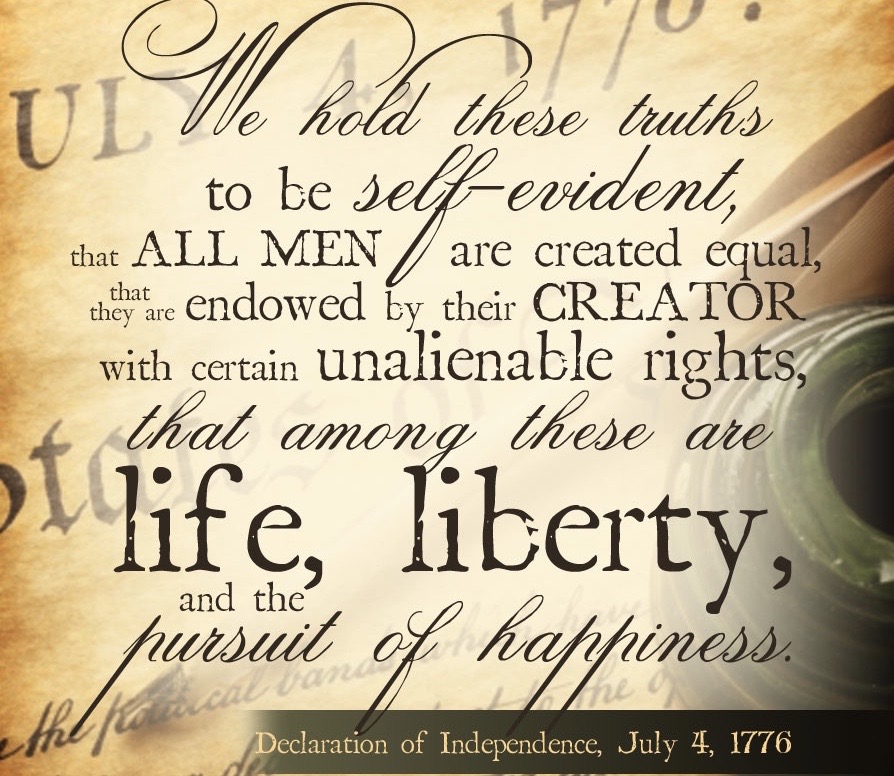By Cryshanna A. Jackson Leftwich, PhD
“We hold these truths to be self-evident, that all men are created equal, that they are endowed by their Creator with certain unalienable Rights, that among these are Life, Liberty and the Pursuit of Happiness (Declaration of Independence).” July 4, 1776, marked the day that America declared its freedom from the rule of Great Britain and became the United States of America. With this promise, the citizens of the United States were guaranteed a better life, the ability to design and run their own government and maintain individual freedoms. What the Declaration of Independence did not do was point out what constituted citizenship and for whom this promise was made.
2019 marked 400 years since the arrival of the first slave ship that landed in Virginia bearing human cargo, 400 years when Americans first devalued human lives of those with black skin, 400 years ago when the journey for African’s who were later deemed Black Americans, were stripped of their rich heritage as Kings, and Queens, Doctors and Lawyers, Carpenters, Accountants, and labeled as Slaves. This is where the journey for Black citizenship began but this is not where it ended. During the Constitutional Convention in which the founding fathers were debating how to improve upon the many weaknesses of the Articles of Confederation a new document was created to rule America, The United States Constitution. In terms of citizenship, the original document did very little to address citizenship for Black people. What they did discuss was how slaves could be used to benefit the South’s political prowess and the three-fifths Compromise was established.
The three-fifths compromise in of itself shows a shameful dark past of just how low people in power will go to exploit power, money, and privilege. This lack of citizenship for African Americans was affirmed by the Supreme Court’s ruling in the Dred Scott v Sanford (1857) court case. The Supreme Court ruled that Scott, whose ancestors were imported from Africa, was not an American citizen therefore he had no legal standing to sue in Federal Court. Black people were not citizens of American and therefore not guaranteed any of America’s promises. After the North defeated the Confederacy the Civil War amendments were passed also known as the 13th, 14th, and 15th Amendments.
The major problem that African American’s faced after the ratification of the Constitution was that the States decided that the US Constitution only applied to the federal government. This was problematic because not only did the States refuse to treat Blacks as citizens but they put rules in place making it almost impossible for any upward mobility or economic gain for Black Americans. These rules came in the form of Black Codes, Jim Crow Laws, evidence of employment, and vagrancy laws that only applied to Black people. If they failed to comply they would end up in jail or working the land they were just freed from.
The Supreme Court eventually applied the 14th amendment to the process of selective incorporation in order to make the Bill of Rights applicable to all levels of government. The 14th Amendment section 1 states “all persons born or naturalized in the United States and subject to the jurisdiction thereof, are citizens of the United States and of the State wherein they reside. This overturned the Dred Scott ruling granting full citizenship to African Americans. The passing of the 14th amendment gave Black American’s full citizenship and protections under the Constitution including the Bill of Rights. Protections that are still being challenged to this day. The Civil Rights movement led to the passing of the Voters Right Act of 1965 and the Civil Rights Act of 1964 but they cannot undo years of redlining, unequal access to loans, lack of educational opportunities, denial of using the GI Bill, generational wealth gaps, and other issues still facing the Black community.
The passing of the 14th amendment ensures citizenship but it does not ensure the place of Black people in America. Racism is defined as institutional and structural policies and practices that cause, intentionally disproportionate negative impacts on people of color. Institutional racism has become a norm in American society due to policies, stereotypes, and a lack of action by the empowered. Racism is inbreed in American society and fueled by white supremacy and ignorance, the beginning of racism spans back to over 400 years. It will not be eliminated by protests or hashtags but by a systematic dismantling of the current broken system. Racial disparities can be found in American society in policing, prosecuting, sentencing, jails, prisons, pre-school, middle school, high school, higher education, corporations, housing, mortgages, loans, mental health, stress, infant mortality, high blood pressure, and every facet of day to day life.
What needs to be done to work towards America’s Promise and overcome systematic racism? We need to address the notion of racism head-on and have those uncomfortable conversations. We must not allow anyone to suggest taking away birthright citizenship, we must get to the polls and take a friend with us and vote on every issue from the local to the federal level. We must actively engage in political forums and with candidates that take seriously the needs of the underrepresented. We must make our voices heard and we cannot get discouraged, frustrated, or give up. There are strengths in numbers and the more numbers we have the more strength we gain. The right to vote is the best tool to overcome and the change the system it is up to us to use it. The fight equality and justice will take time, but the last one standing will get their promise, there is life, liberty, and the pursuit of happiness waiting for us, it time we grab it.
Dr. Cryshanna A. Jackson Leftwich is an Associate Professor in the Department of Humanities and Social Sciences in the political science program at Youngstown State University where she also serves as the Urban Internship Coordinator and the Director of Women’s and Gender Studies. Her research interests focus on public policies pertaining to social equity, civil rights, and gender equality. Since joining the faculty at YSU Dr. Jackson has served on numerous committees.


Recent Comments